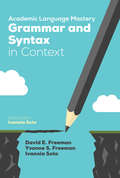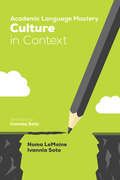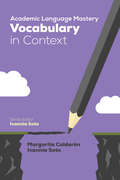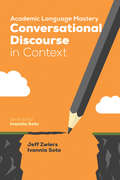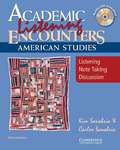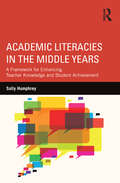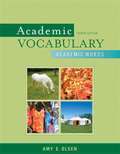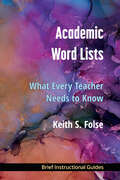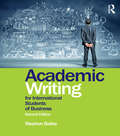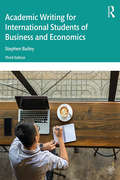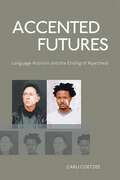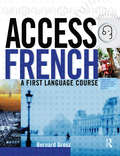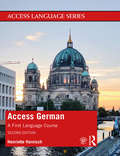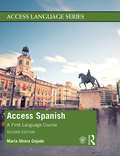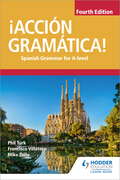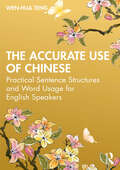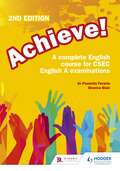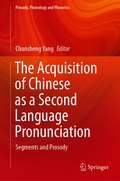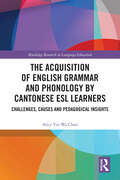- Table View
- List View
Academic Language Mastery: Grammar And Syntax In Context
by David E. Freeman Dr Yvonne S. Freeman Ivannia M. SotoBy now it’s a given: if we’re to help our ELLs and SELs access the rigorous demands of today’s content standards, we must cultivate the “code” that drives school success: academic language. Look no further for assistance than this much-anticipated series from Ivannia Soto, in which she invites field authorities Jeff Zwiers, David and Yvonne Freeman, Margarita Calderon, and Noma LeMoine to share every teacher’s need-to-know strategies on the four essential components of academic language. The subject of this volume is grammar and syntax. Here, David and Yvonne Freeman shatter the myth that academic language is all about vocabulary, revealing how grammar and syntax inform our students’ grasp of challenging text. With this book as your roadmap, you’ll learn how to: Teach grammar in the context of students’ speech and writing Use strategies such as sentence frames, passives, combining simple sentences into more complex sentences, and nominalization to create more complex noun phrases Assess academic language development through a four-step process Look inside and discover the tools you need to help students master more sophisticated and complex grammatical and syntactical structures right away. Better yet, read all four volumes in the series and put in place a start-to-finish instructional plan for closing the achievement gap.
Academic Language Mastery: Grammar And Syntax In Context
by David E. Freeman Ivannia M. Soto Dr Yvonne S. FreemanBy now it’s a given: if we’re to help our ELLs and SELs access the rigorous demands of today’s content standards, we must cultivate the “code” that drives school success: academic language. Look no further for assistance than this much-anticipated series from Ivannia Soto, in which she invites field authorities Jeff Zwiers, David and Yvonne Freeman, Margarita Calderon, and Noma LeMoine to share every teacher’s need-to-know strategies on the four essential components of academic language. The subject of this volume is grammar and syntax. Here, David and Yvonne Freeman shatter the myth that academic language is all about vocabulary, revealing how grammar and syntax inform our students’ grasp of challenging text. With this book as your roadmap, you’ll learn how to: Teach grammar in the context of students’ speech and writing Use strategies such as sentence frames, passives, combining simple sentences into more complex sentences, and nominalization to create more complex noun phrases Assess academic language development through a four-step process Look inside and discover the tools you need to help students master more sophisticated and complex grammatical and syntactical structures right away. Better yet, read all four volumes in the series and put in place a start-to-finish instructional plan for closing the achievement gap.
Academic Language Mastery: Culture In Context
by Noma R. LeMoine Ivannia M. SotoBy now it’s a given: if we’re to help our ELLs and SELs access the rigorous demands of today’s content standards, we must cultivate the “code” that drives school success: academic language. Look no further for assistance than this much-anticipated series from Ivannia Soto, in which she invites field authorities Jeff Zwiers, David and Yvonne Freeman, Margarita Calderon, and Noma LeMoine to share every teacher’s need-to-know strategies on the four essential components of academic language. The subject of this volume is culture. Here, Noma LeMoine makes clear once and for all how culturally and linguistically responsive pedagogy validates, facilitates, liberates, and empowers ethnically diverse students. With this volume as your roadmap, you’ll learn how to: Implement instructional strategies designed to meet the linguistic and cultural needs of ELLs and SELs Use language variation as an asset in the classroom Recognize and honor prior knowledge, home languages, and cultures The culture and language every student brings to the classroom have vast implications for how to best structure the learning environment. This guidebook will help you get started as early as tomorrow. Better yet, read all four volumes in the series as an all-in-one instructional plan for closing the achievement gap.
Academic Language Mastery: Vocabulary In Context
by Ivannia M. Soto Margarita Espino CalderonBy now it’s a given: if we’re to help our ELLs and SELs access the rigorous demands of today’s content standards, we must cultivate the “code” that drives school success: academic language. Look no further for assistance than this much-anticipated series from Ivannia Soto, in which she invites field authorities Jeff Zwiers, David and Yvonne Freeman, Margarita Calderon, and Noma LeMoine to share every teacher’s need-to-know strategies on the four essential components of academic language. The subject of this volume is vocabulary. Here, Margarita Calderon reveals how vocabulary is best taught as a tool for completing and constructing more complex messages. With this book as your roadmap, you’ll learn how to: Teach high-frequency academic words and discipline-specific vocabulary across content areas Utilize strategies for teaching academic vocabulary, moving students from Tier 1 to Tiers 2 and 3 words and selecting appropriate words to teach Assess vocabulary growth as you go Our vocabulary instruction must come from the texts our ELLs and SELs are about to read, not from a set of activities that teach words in isolation. This guidebook will help you get started as early as tomorrow. Better yet, read all four volumes in the series and put in place an all-in-one instructional plan for closing the achievement gap.
Academic Language Mastery: Culture In Context
by Ivannia M. Soto Noma R. LeMoineBy now it’s a given: if we’re to help our ELLs and SELs access the rigorous demands of today’s content standards, we must cultivate the “code” that drives school success: academic language. Look no further for assistance than this much-anticipated series from Ivannia Soto, in which she invites field authorities Jeff Zwiers, David and Yvonne Freeman, Margarita Calderon, and Noma LeMoine to share every teacher’s need-to-know strategies on the four essential components of academic language. The subject of this volume is culture. Here, Noma LeMoine makes clear once and for all how culturally and linguistically responsive pedagogy validates, facilitates, liberates, and empowers ethnically diverse students. With this volume as your roadmap, you’ll learn how to: Implement instructional strategies designed to meet the linguistic and cultural needs of ELLs and SELs Use language variation as an asset in the classroom Recognize and honor prior knowledge, home languages, and cultures The culture and language every student brings to the classroom have vast implications for how to best structure the learning environment. This guidebook will help you get started as early as tomorrow. Better yet, read all four volumes in the series as an all-in-one instructional plan for closing the achievement gap.
Academic Language Mastery: Conversational Discourse in Context
by Jeff Zwiers Ivannia M. SotoBy now it’s a given: if we’re to help our ELLs and SELs access the rigorous demands of today’s content standards, we must cultivate the “code” that drives school success: academic language. Look no further for assistance than this much-anticipated series from Ivannia Soto, in which she invites field authorities Jeff Zwiers, David and Yvonne Freeman, Margarita Calderon, and Noma LeMoine to share every teacher’s need-to-know strategies on the four essential components of academic language. The subject of this volume is conversational discourse. Here, Jeff Zwiers reveals the power of academic conversation in helping students develop language, clarify concepts, comprehend complex texts, and fortify thinking and relational skills. With this book as your roadmap, you’ll learn how to: Foster the skills and language students must develop for productive interactions Implement strategies for scaffolding paired conversations Assess student’s oral language development as you go It’s imperative that our ELLs and SELs practice academic language in rich conversations with others in school, especially when our classrooms may be their only opportunities to receive modeling, scaffolding, and feedback focused on effective discourse. This book, in concert with the other three volumes in the series, can provide both a foundation and a framework for accelerating the learning of diverse students across grade levels and disciplines.
Academic Language Mastery: Conversational Discourse in Context
by Jeff Zwiers Ivannia M. SotoBy now it’s a given: if we’re to help our ELLs and SELs access the rigorous demands of today’s content standards, we must cultivate the “code” that drives school success: academic language. Look no further for assistance than this much-anticipated series from Ivannia Soto, in which she invites field authorities Jeff Zwiers, David and Yvonne Freeman, Margarita Calderon, and Noma LeMoine to share every teacher’s need-to-know strategies on the four essential components of academic language. The subject of this volume is conversational discourse. Here, Jeff Zwiers reveals the power of academic conversation in helping students develop language, clarify concepts, comprehend complex texts, and fortify thinking and relational skills. With this book as your roadmap, you’ll learn how to: Foster the skills and language students must develop for productive interactions Implement strategies for scaffolding paired conversations Assess student’s oral language development as you go It’s imperative that our ELLs and SELs practice academic language in rich conversations with others in school, especially when our classrooms may be their only opportunities to receive modeling, scaffolding, and feedback focused on effective discourse. This book, in concert with the other three volumes in the series, can provide both a foundation and a framework for accelerating the learning of diverse students across grade levels and disciplines.
Academic Listening Encounters: Listening, Note Taking, Discussion (Intermediate)
by Kim Sanabria Carlos SanabriaThis book engages students through interviews and academic lectures on stimulating topics from the field of American Studies. Topics include civil rights, traditional American values in relation to life today, country music, sports, and the globalization of American slang.
Academic Literacies in the Middle Years: A Framework for Enhancing Teacher Knowledge and Student Achievement
by Sally HumphreyThe professional learning framework this book presents is designed to support teachers’ understandings of how language functions in their academic disciplines. This framework—a 4 x 4 metalinguistic toolkit—is informed by systemic functional linguistic theory and international educational research on academic and disciplinary literacies. The book shows and explains how teachers have applied specific 4 x 4 toolkits with students in middle school classrooms across a range of subjects for curriculum literacy instruction, assessment and feedback, resulting in substantial growth for their students in high-stakes national tests of literacy, as well as writing assessments in a number of subjects. In its focus on disciplinary literacies in diverse sociocultural settings, Academic Literacies in the Middle Years responds to contemporary international curricula for English language and literacy and the need for a strong evidence base for professional learning design.
Academic Vocabulary, Academic Words (4th edition)
by Amy E. OlsenAcademic Vocabulary presents vocabulary building with a visually stimulating, full-color design to pique students' interest and make the process fun. This attractive, highly-interactive workbook improves academic word knowledge through academic readings and interactive exercises. Repetition of the words and getting the students to see the words used in multiple contexts improves memorization.
Academic Word Lists: What Every Teacher Needs to Know
by Keith S. FolseIn Academic Word Lists, Keith Folse explains how various lists like the Academic Word List (AWL) have become popular tools in the ESL classroom for teaching vocabulary. Following a discussion on the importance of teaching vocabulary, Folse explains why word lists are useful in language learning and how they can help address the lexical gap. He also outlines what words are on the AWL, how the word families are selected, and what teachers should know about other word lists. The book also includes 10 suggestions for using academic word lists in the classroom, including how to use vocabulary notebooks.
Academic Writing for International Students of Business
by Stephen BaileyInternational students of Business or Economics often need to write essays and reports for exams and coursework, and this new, second edition of Academic Writing for International Students of Business has been completely revised and updated to help them succeed with these tasks. This book explains the academic writing process from start to finish, and practises all the key writing skills in the context of Business Studies. The book can be used either with a teacher or for self-study, and is clearly organised into four parts, with each divided into short units that contain examples, explanations and exercises for use in the classroom or for self-study: The Writing Process, from assessing sources to proofreading Elements of Writing, practising skills such as making comparisons Vocabulary for Writing, dealing with areas such as nouns and adjectives, adverbs and verbs, synonyms, prefixes and prepositions, in an academic context Writing Models, illustrating case studies, reports, longer essays and other key genres This is an up-to-date book that reflects the interests and issues of contemporary Business Studies, with revised exercises, updated reading texts and a new glossary to ensure accessibility and maximise usability. Students wanting to expand their academic potential will find this practical and easy-to-use book an invaluable guide to writing in English for their degree courses, and it will also help students planning a career with international companies or organisations, where proficiency in written English is a key skill. All aspects of writing clearly explained, with full glossary for reference Full range of practice exercises, with answer key included Use of authentic academic texts Fully updated, with sections on finding electronic sources and evaluating internet material
Academic Writing for International Students of Business and Economics
by Stephen BaileyThe third edition of Academic Writing for International Students of Business and Economics is written to help international students succeed in writing essays, reports and other papers for their English-language academic courses. Thoroughly revised and updated to reflect issues such as diversity and sustainability, this book is designed to let students and teachers easily find the help they need, both in the classroom and for self-study. The book is divided into five parts, comprising a total of 42 units: The Writing Process Elements of Writing Language Issues Vocabulary for Writing Writing Models New topics in this edition include Writing in Groups, Written British and American English and Reflective Writing. In addition, the new interactive website has a full set of teaching notes as well as more challenging exercises, revision material and links to other sources. Additional features of the book include: Models provided for writing tasks such as case studies and literature reviews Use of authentic academic texts from a range of sources Designed for self-study as well as classroom use Useful at both undergraduate and postgraduate level A complete set of answers to the practice exercises Cross-references across all units Providing a glossary to explain technical terms and written to deal with the specific language issues faced by international students of Business and Economics, this practical, user-friendly book is an invaluable guide to academic writing in English.
Accented Futures: Language activism and the ending of apartheid
by Carli CoetzeeIn this wonderfully original, intensely personal yet deeply analytical work, Carli Coetzee argues that difference and disagreement can be forms of activism to bring about social change, inside and outside the teaching environment. Since it is not the student alone who needs to be transformed, she proposes a model of teaching that is insistent on the teacher?s scholarship as a tool for hearing the many voices and accents in the South African classroom. For Coetzee, ?accentedness? is a description for actively working towards the ending of apartheid by being aware of the legacies of the past, without attempting to empty out or gloss over the conflicts and violence that may exist under the surface. In the broad context of education, ?accent? can be an accent of speech; an attitude; a stance against being ?understood?; yet a way of teaching that requires teacher and pupil to understand each other?s contexts. This is a book about the relationships created by the use of language to convey knowledge, particularly in translation. The ideas it presents are evocative, thought-provoking and challenging at times. Accented Futures makes a significant and important contribution to research on identity in post-apartheid South Africa as well as to the fields of education and translation studies.
Access French: A First Course For Adults (Access Language Series)
by Bernard Grosz Henriette HarnischAccess is the major new language series designed with the needs of today's generation of students firmly in mind. Whether learning for leisure or business purposes or working towards a curriculum qualification, Access French is specially designed for adults of all ages and gives students a thorough grounding in all the skills required to understand, speak, read and write contemporary French from scratch.The coursebook consists of 10 units covering different topic areas, each of which includes Language Focus panels explaining the structures covered and a comprehensive glossary. Learning tips and assessment checklists help students to achieve a sense of autonomy while at the end of each unit, a Découverte de la Francophonie section presents short texts of cultural interest. Numerous references to web-based activities, which will be an invaluable support to students' learning, add significantly to the course. The accompanying free Website gives direct access to additional internet-based activities for students, plus teacher support and guidance.
Access German: A First Language Course (Access Language Series)
by Henriette HarnischAccess German: A First Language Course provides a thorough grounding in all the skills required to understand, speak, read and write contemporary German from scratch based on everyday scenarios. This fully revised edition consists of 10 units, each of which includes language focus panels explaining the structures covered, cultural focus sections with current information from Germany and other German-speaking countries, and a comprehensive glossary. Learning tips and Ready to move on checklists help students to achieve a sense of autonomy, while the accompanying website gives direct access to additional listening, reading and speaking activities, plus teacher support and guidance. Access German is ideal for adult learners and students at level A1–A2 of the CEFR, and Novice–Low on the ACTFL proficiency scales.
Access Spanish: A First Language Course (Access Language Series)
by María Utrera CejudoAccess Spanish: A First Language Course provides a thorough grounding in all the skills required to understand, speak, read and write contemporary Spanish from scratch. This fully revised edition consists of 10 units, each of which includes Language Focus panels explaining the structures covered and Descubre el mundo hispano boxes providing cultural insight into the Spanish-speaking world. Learning Tips and Ready to Move On checklists help students to achieve a sense of autonomy, while the accompanying website gives direct access to additional listening, reading and speaking activities, plus teacher support and guidance. Updated audio tracks for this edition are also available online at www.routledge.com/9781138476684. Access Spanish is ideal for adult learners and students at level A1–A2 of the CEFR, and Novice Low on the ACTFL proficiency scales.
¡Acción Gramática! Fourth Edition: Spanish Grammar for A Level
by Phil Turk Mike Zollo Francisco VillatoroExam board: AQA, Edexcel, OCR, WJEC/EduqasLevel: A-levelSubject: SpanishFirst teaching: September 2016First exams: Summer 2018Make Spanish grammar second nature with this trusted reference book containing over 300 activities - now completely revised in line with the new A-level specifications.- Supplement key resources in class or encourage independent practice at home, with clear explanations of the grammar points needed at A-level and knowledge-check exercises throughout - Prepare for assessment with longer application activities focused on developing writing skills such as translation and summary - Build confidence as exercises get increasingly more challenging to mirror students' advancement throughout the course - Check students' progress with regular grammar tests and all answers supplied online
¡Acción Gramática! Fourth Edition: Spanish Grammar for A Level
by Phil Turk Mike Zollo Francisco VillatoroExam board: AQA, Edexcel, OCR, WJEC/EduqasLevel: A-levelSubject: SpanishFirst teaching: September 2016First exams: Summer 2018Make Spanish grammar second nature with this trusted reference book containing over 300 activities - now completely revised in line with the new A-level specifications.- Supplement key resources in class or encourage independent practice at home, with clear explanations of the grammar points needed at A-level and knowledge-check exercises throughout - Prepare for assessment with longer application activities focused on developing writing skills such as translation and summary - Build confidence as exercises get increasingly more challenging to mirror students' advancement throughout the course - Check students' progress with regular grammar tests and all answers supplied online
The Accurate Use of Chinese: Practical Sentence Structures and Word Usage for English Speakers
by Wen-Hua TengThe Accurate Use of Chinese: Practical Sentence Structures and Word Usage for English Speakers is a unique learning resource for learners of Chinese who are English speakers. The primary goal is two-fold: to help these learners leverage their existent knowledge in English and navigate the Chinese system with fewer obstacles; and also to help them prevent errors of which the underlying cause may be English. This is done through comparisons of selected grammar topics, language rules and word usages between the two languages. Grammar topics in English serve as the comparison points from which learners can gain a deeper understanding of the comparable, but differing structures in Chinese. The book's comparative approach is unique and innovative, designed to build a more nuanced and instinctive approach to grammar. A valuable resource for beginners to advanced learners and instructors of Chinese, the book contextualizes grammar structures and provides in-depth information not covered in Chinese language textbooks.
Achieve! A complete English course for CSEC English A examinations: 2nd Edition
by Paulette FerariaEnsure complete coverage of the new CSEC English syllabus with focused exam-practice and SBA guidance.- Test understanding with Paper 2 practice focusing on summary writing skills, expository writing, narrative discourse and persuasive discourse, plus practice Paper 1 items throughout.- Help students prepare for SBA with annotated examples and rubrics.- Develop comprehension skills with a genre-based approach.- Support students of all abilities with an in incremental approach that builds writing skills through practice exercises.
Achieve! A complete English course for CSEC English A examinations: 2nd Edition
by Paulette FerariaEnsure complete coverage of the new CSEC English syllabus with focused exam-practice and SBA guidance.- Test understanding with Paper 2 practice focusing on summary writing skills, expository writing, narrative discourse and persuasive discourse, plus practice Paper 1 items throughout.- Help students prepare for SBA with annotated examples and rubrics.- Develop comprehension skills with a genre-based approach.- Support students of all abilities with an in incremental approach that builds writing skills through practice exercises.
The Acquisition of Chinese as a Second Language Pronunciation: Segments and Prosody (Prosody, Phonology and Phonetics)
by Chunsheng YangThis book is the first edited book to cover a wide range of issues related to Chinese as a second language (CSL) speech, including tone and segment acquisition and processing, categorical perception of tones, CSL fluency, CSL intelligibility/comprehensibility and accentedness, and pronunciation pedagogy. Moreover, the book addresses both theoretical and pedagogical issues. It offers an essential go-to book for anyone who is interested in CSL speech, e.g. CSL speech researchers, Chinese instructors, CSL learners, and anyone interested in second language speech.
The Acquisition of Creole Languages
by Dany AdoneHow do children acquire a Creole as their first language? This relatively underexplored question is the starting point for this first book of its kind; it also asks how first language acquisition of a Creole differs from that of a non-Creole language. Dany Adone reveals that in the absence of a conventional language model, Creole children acquire language and go beyond the input they receive. This study discusses the role of input, a hotly debated issue in the field of first language acquisition, and provides support for the nativist approach in the debate between nativism and input-based models. The Acquisition of Creole Languages will be essential reading for those in the fields of first language acquisition and Creole studies. Adone takes an interdisciplinary approach, using insights from non-verbal language acquisition, which makes this of great interest to those in the field of sign linguistics.
The Acquisition of English Grammar and Phonology by Cantonese ESL Learners: Challenges, Causes and Pedagogical Insights (Routledge Research in Language Education)
by Alice Yin ChanChan’s exploration of the acquisition of English grammar and phonology by Cantonese learners of English as a Second Language (ESL) offers insights into the specific challenges that learners often encounter and posits ways to help them overcome those challenges. Possible sources of the challenges are also examined. The book covers the basic differences between English and Cantonese grammar as well as those between English and Cantonese phonology. Chan discusses the kinds of grammatical and phonological problems that Cantonese ESL learners often have in their acquisition of English. In terms of grammar, various structures are reviewed, including errors which are clearly due to L1 interference and also those which may not be directly L1-related. Learners’ common misconceptions about relevant concepts are also revealed. In terms of phonology, both speech perception and speech production problems at the segmental and suprasegmental levels are examined. For learner problems which may be the result of L1 interference, a contrastive approach is adopted in analysing the cause and nature of the errors. Chan also offers readers pedagogical insights to target common grammatical problems, including the use of an algorithmic approach, the use of a discovery-based consciousness-raising approach and the use of metalinguistic explanations. As far as the learning of English phonology is concerned, she argues that the training of speech production should go hand-in-hand with that of speech perception. Future research can experiment with the proposed teaching ideas with Cantonese ESL learners and learners of other native languages. Researchers and ESL teaching professionals will find the insights and research contained within this volume invaluable when encountering or researching Chinese ESL learners.
